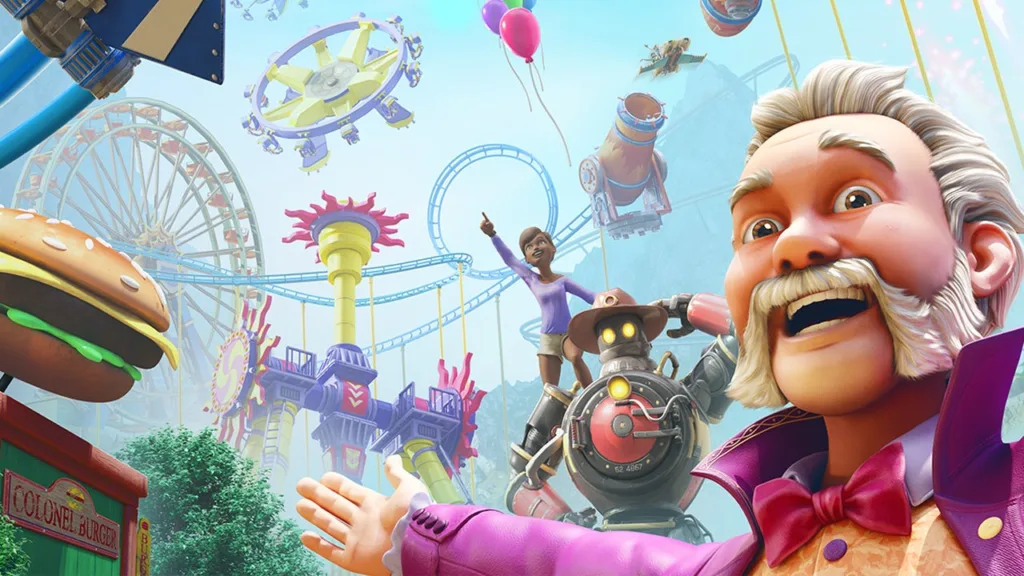
The magic of a park sim is its ability to make time disappear. When you are in the zone building your park, managing the wants and needs of your attendees, and creating a self-sustaining financial juggernaut, there’s potential for an almost euphoric Zen from the best of the genre. At its best, Park Beyond hits these highs with interesting rides, a simple and compelling upgrade system, and a whimsical sense of imagination. But, like a poorly maintained rollercoaster, there’s a looming threat that things will fall apart with disastrous results. It’s this tendency for things to come off the rails that left me feeling queasy after spending a few days in this park.
A game like this lives and dies by its building mechanics, and Park Beyond is pretty solid in that regard. Crafting a thriving and growing park from scratch is a lot of fun: building paths, flat rides, roller coasters, and shops is easy, thanks in part to a simple interface and controls that are straightforward when it comes to the simple stuff.
After your grand opening there’s a linear, step-by-step process to upgrading and expanding your park that’s easy to understand and fun to execute. The capacity, and by extension income potential, of the park is limited at first. In the beginning there are only a few rides that can be built to entice customers. The amount of fun people have and the cleanliness of the park increases Park Appeal. Earn enough appeal and the park ranks up, increasing capacity and unlocking additional rides and shops.
Which upgrades to select presents an interesting tactical choice.
Which upgrades to select presents an interesting tactical choice. You can focus on obvious things, like unlocking shops to fulfill basic needs like food and drink and add some more basic ride options. Or you can be more strategic, unlocking options that appeal to a specific demographic (such as adults), or rides that prioritize fun over profitability to gamble that you can build a large base of customers quickly and then capitalize on them later. The moments when I’m clicking back and forth between different options, torn about what to select, is agonizing and engaging in the best way.
The key differentiator between Park Beyond and other park sims is its fantasy concept of “impossificaiton.” As the amazement of your guests accumulates, you earn the ability to pull out a magic pencil and supercharge rides or employees. Suddenly that Shining Pendulum transforms into a colorful launcher of human-filled spinning tops, or that Ring of Fire loses the top of the arch, and launches riders from one side to the other while spinning like someone juggling on a turntable. It’s hilarious and wondrous, with a whimsical imagination that one would expect from a Roald Dahl book. I couldn’t help but smile the first time I impossified one of my janitors and he started cremating the nearby trash bins with a full on flamethrower.
It’s hilarious and wondrous, with a whimsical imagination.
Some rides can even be impossified twice to become… impossibler? Each upgrade increases potential fun, amazement, and profit, but also adds to upkeep cost, and that’s unfortunately one of many areas where poor economic tuning becomes an issue for Park Beyond. Some rides become devastating financial drains after the upgrades, which turns the promise of a park filled with joyfully ludicrous machinery into a trap leading to financial ruin. Often the best long-term strategy is to play it safe with conventional rides, which can suck the soul out of these fantastical parks and reduce them to something run-of-the-mill.
That kind of oversight is unfortunately par for the course when it comes to the fiscal aspects of managing your park. Customer appeal, for instance, is unpredictable to the point of feeling random. A ride can be red hot one moment, then a money pit the next without any changes to ticket prices. Some evolution in park-goer taste over time makes sense, especially as rides age, but the wild swings from crowded to abandoned defy strategy, and mature parks have an unfortunate tendency to go from extremely positive cash flow to hemorrhaging money, seemingly in the blink of an eye and without explanation, which can be a miserable experience.
What’s much more dependable are the roller coaster construction options, which should feel familiar to park sim veterans whether you’re building from scratch or selecting from prefabricated rides. Simple rail and chain lift options are enough to get a roller coaster going, and building simple rides is a breeze while more complex ones can be a challenge, as you’d expect. Unfortunately there’s an issue that crops up here as well when you get into the fancier options: there are enjoyably absurd modules that can fire cars out of cannons, or send them across open fields in giant hamster balls a la Jurassic World, but those come with the catch that getting tracks to point in the desired direction is like wrestling a fire hose. I often found myself giving up on opportunities to use the terrain in neat ways with tunnels, switchbacks, or loops, as the simple act of placing tracks became more trouble that it was worth. That stifled my more creative urges in a disappointing way.
No direct control options exist: you are fully at the mercy of the AI.
Even so, I was generally satisfied with the rides I was able to produce, but that just made the abysmal staff managing them that much more aggravating. Roles that keep your park clean and running are essential to earn income and raise your park appeal, but the people available to hire to do them operate with a terrible lack of basic sense. Is that ride shooting sparks and about to catch fire? Better fix up this seldom-used vending machine instead! Janitors will ignore heaps of litter in the streets to empty far-flung trash bins, and mechanics will ignore rides on the verge of collapse. That would be excusable if this were the kind of game where you could directly control them or manually set priorities, but no such options exist: you are fully at the mercy of the AI. The only solution is often to overstaff and hope for the best, which is a frustrating feeling when you are trying to grow your park on a shoestring budget.
Then there’s the park attendees themselves. They’re the true villains of Park Beyond, but through no fault of their own. The people you need to please and collect money from simply break at times. On several occasions I had a park that I thought was fully dialed in with great rides, plenty of food, drink, and bathroom options – earning strong metrics all around – only to have a total collapse of customer sentiment because entire crowds of people became frozen in place, unable to satisfy their basic needs or spend money at rides. Sometimes you can fix it by closing and reopening a ride, other times I had to delete chunks of my park, and in some cases I had to restart missions entirely. Eventually I just started checking every inch of my park for glitched attractions for customers every few minutes, a tedious necessity to keep things operating.
That bugginess unfortunately doesn’t stop there. I’ve had immaculate parks’ scores ruined by invisible garbage, seen sidewalks disappear below ground, and entire shops lose their identity and become groups of dissociated parts. Some of these things are annoying, like employees getting stuck in the staff lounge until I delete it, and others are soul crushing, like the handful of hard crashes that undid untold amounts of focused park construction. It’s aggravating, and any large park feels like a ticking time bomb, ready to rob hours of work seemingly at random. Reverting to a manual or autosave is an option, but often introduces new bugs, and an inexplicably crashing balance sheet that had been healthy on the previous run through.
The threat of bugs dangles over you regardless of which of the two main modes you choose, but they do a good job mixing up the ways you can approach park building. First, there’s the Campaign, which throws you into eight increasingly difficult park-building scenarios, acting as a cross between a tutorial and story-driven challenge. While the story and characters are a forgettably generic group of scrappy park builders, the first few missions do a great job introducing a unique wrinkle that gives each one a different feel. One has you taking over a failing park that’s in need of your deft touch to turn it around. Another places you at the center of an archipelago, racing to earn money fast enough to buy the surrounding islands before they get turned into parking lots. It keeps things fresh and exciting, and makes for some good park-building puzzles.
The later missions, however, are a slog. The difficulty spikes considerably, which isn’t necessarily a bad thing when done well, but a slim margin of error just isn’t compatible with the unpredictable systems and unreliable tech. Rather than a triumphant culmination of all my skills, beating the last mission after about 40 hours felt more like the end of a prison sentence.
Sandbox is a much more consistent experience, and a more fun way to play. There are over two dozen maps to start with and build from. I like that you can assign yourself optional goals and starting funds, or just take unlimited money with no objectives and focus on creative freedom. This is where the whacky construction really shines, and it’s easy to lose hours (which, again, is the mark of a good park sim) to creating increasingly impossible roller coasters. It doesn’t have nearly as many customizations options as something like Planet Coaster, especially on the flat rides, but pulling the magic marker out and turning all the rides into delightful absurdities is well worth the tradeoff.






